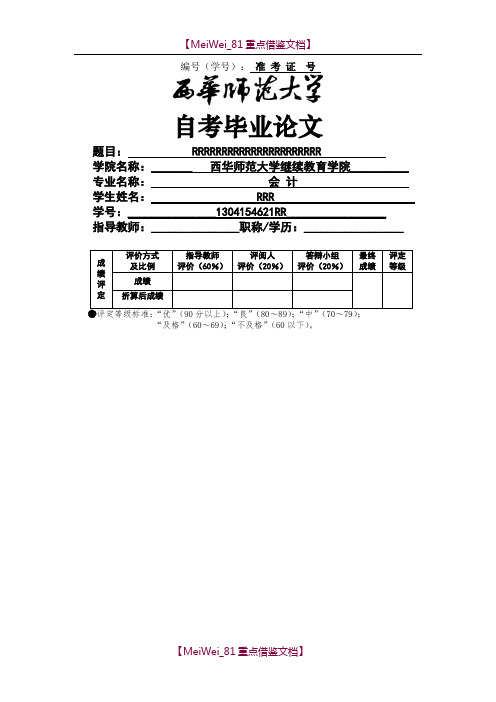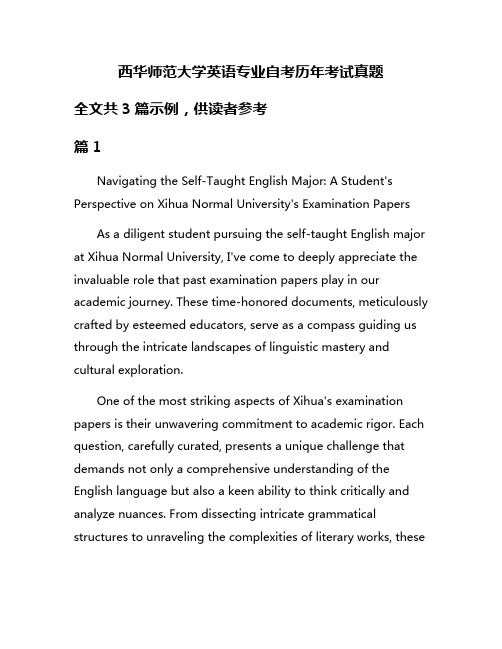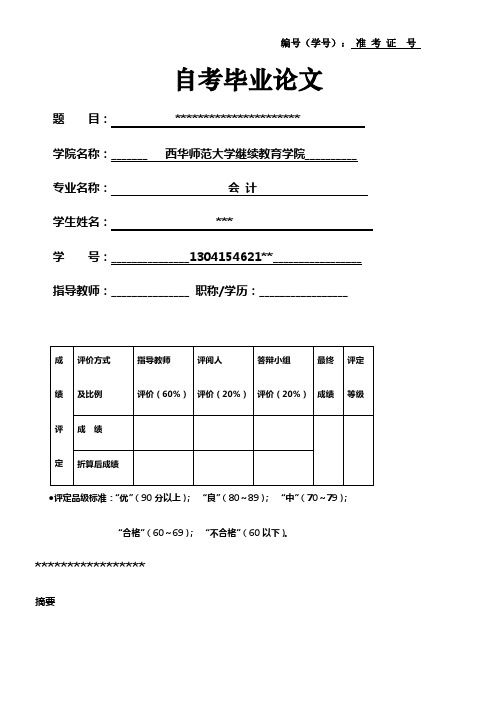西华师范大学自考介绍
- 格式:doc
- 大小:25.00 KB
- 文档页数:1

编号(学号):准考证号
自考毕业论文
题目: RRRRRRRRRRRRRRRRRRRRRR
学院名称:_______ 西华师范大学继续教育学院__________ 专业名称:会计
学生姓名: RRR 学号:_______________1304154621RR_________________
指导教师:_______________职称/学历:_________________
“及格”(60~69);“不及格”(60以下)。
RRRRRRRRRRRRRRRRR 摘要
关键词
目录
摘要、关键词 (Ⅰ)
一、诈骗类犯罪主观要件刑法解读 (1)
二、非法占有目的法律特性分析 (2)
(一)、事实上的非法控制性 (3)
(二)、非法所有性 (4)
(三)、“恶意占有”性 (5)
(四)、非法占有的二种形态 (6)
(五)、主观目的同一性 (6)
三、认定方法探析 (6)
(一)要素分析法主要内容 (6)
(二)要素分析法的启示 (7)
(三)认定的理性方法 (7)
四、构建认定制度 (8)
参考文献 (13)
结论 (13)
致谢 (14)
正文结论
参考文献
致谢。

一、西华师范大学的成人教育形式西华师范大学,是南充的一所二本类师范大学,是川内知名的大学。
其成人教育学院开设成人自学考试和成人高考两种形式的继续教育。
自考为学校和教育考试院共同组织考试,分为校考和统考;成人高考学员只需参加完考试院组织的入学考试即可入学,毕业轻松。
二、西华师范大学自考开设专业专科:汉语言文学、学前教育、法律、小学教育本科:汉语言文学、汉语言文学教育、法律、行政管理学、建筑经济管理、英语、英语教育、工商企业管理、市场营销、计算机信息管理、会计、数学教育、旅游管理、人力资源管理、教育管理、学前教育、小学教育、音乐教育、美术教育、计算机网络、工程造价管理、销售管理、环境艺术设计、艺术设计三、西华师范大学成人高考开设的专业专科:物业管理、行政管理、人力资源管理、计算机应用技术、服装设计、广告设计与制作、新闻采编与制作、会计电算化、经济管理、市场营销、电子商务、工商企业管理、金融保险、语文教育、数学教育、物理教育、英语教育、音乐教育、商务日语、美术教育、体育教育、学前教育、工程造价、国土资源管理本科:新闻学、汉语言文学、思想政治教育、历史学、教育学、法学、体育教育、学前教育、小学教育、英语、音乐学、美术学、数学与应用数学、会计学、物理学、化学、计算机科学与技术、艺术设计、工商管理、社会工作、生物科学、土地资源管理、人力资源管理、行政管理、播音与主持艺术、舞蹈学。
四、报名地址南充市顺庆区文化路89号锦绣北湖1栋22楼9号五、咨询电话现在我们可以在网上搜索到很多这类的信息,我们需要做的就是判断这些机构资质是否齐全,教学质量好不好。
在这里给大家推荐一家非常专业的学历提升机构,南充思普教育。
机构的老师非常负责,不管是专业选择还是学校选择都能给大家提供咨询服务。

西华师范大学应用型自考开设专科专业专科法律(Z030112):统考科目:00242民法学、00243民事诉讼法学、00245刑法学、05679宪法学、00260刑事诉讼法学、00261行政法学。
校考科目:00244 经济法概论、00247 国际法、00001 马克思主义哲学原理、00002 邓小平理论概论、00003 法律基础与思想道德修养、00223 中国法制史、03706 思想道德修养与法律基础、04729 大学语文、05677 法理学汉语言文学(Z050114):统考课程:00506写作(一)、00529文学概论(一)、00530中国现代文学作品选、00532中国古代文学作品选(一)、00533中国古代文学作品选(二)、00535现代汉语、校考课程:00001 马克思主义哲学原理、00003法律基础与思想道德修养、00031心理学、00410小学语文教学论、00002邓小平理论概论、00531中国当代文学作品选、00534外国文学作品选、00536古代汉语、03707 毛泽东思想、邓小平理论和“三个代表”重要思想概论等学前教育(Z040101):统考科目:00018计算机应用基础、00383学前教育学、00384学前心理学、00385学前卫生学、00386幼儿文学、00387幼儿园组织与管理校考科目:00388学前儿童数学教育、00390学前儿童科学教育、00392学前儿童体育、00393学前儿童语言教育、04729大学语文、00396学前儿童美术教育、00397学前儿童音乐教育、00001马克思主义哲学原理、00003法律基础与思想道德修养等本科法律(Y030106):统考科目:00167劳动法、知识产权法、00233税法、00249国际司法、00262法律文书写作、00259公证与律师制度校考科目:00227公司法、00228环境与资源保护学、00230合同法、00246国际经济法概论、00263外国法制史、00264中国法律思想史、03709马克思主义基本原理概论、05680婚姻家庭法、03708中国近现代史纲要汉语言文学(Y050105):统考科目:外国文学史00540 、语言学概论00541、中国现代文学史00537 、中国古代文学史(一)00538、中国古代文学史(二)00539 、03709 马克思主义基本原理概论校考科目:00037 美学、00814中国古代文论选读、00058市场营销学、00181广告学(一)、00634广告策划、00642传播学概论、07562报告文学研究、08101新闻采访与写作、08103影视艺术概论、10543散文文学研究、00005马克思主义政治经济学原理、03709马克思主义基本原理概论、00004毛泽东思想概论学前教育(Y040102):统考科目:00015英语(二)【转校考】、00018计算机应用基础、00398学前教育原理、00399学前游戏论、00402学前教育史、00881学前教育科学研究与论文写作、00882学前教育心理学校考科目:00403 学前儿童家庭教育、00467课程与教学论、00883学前特殊儿童教育、00884学前教育行政与管理、00885学前教育诊断与咨询、00886学前儿童心理卫生与辅导、00409美育基础、00887儿童文学名著导读、03709马克思主义基本原理概论、00004毛泽东思想概论会计(Y020204):统考课程:00058 市场营销学、00149 国际贸易理论与实务、00150 金融理论与实务、00159 高级财务会计、00160 审计学、00161 财务报表分析、00015 英语(二)【转校考】校考科目:00042 社会经济统计学原理、00068 外国财政、00071 社会保障概论、00162 会计制度设计、04184 线性代数(经管类)、00004 毛泽东思想概论、00051 管理系统中计算机应用、00158 资产评估、03708 中国近现代史纲要、04183 概率论与数理统计(经管类)、 05327 税务会计、07246 会计电算化基础工商企业管理(Y020202):统考科目:英语(二)【转校考】、00015 ;管理学原理00054 ;国际贸易理工与实务00149 ;金融理论与实务00150 ;企业经营战略00151;组织行为学00152 ;质量管理学00153;校考科目:社会经济统计学原理00042 ;国家税收00061;社会保障概论00071 ;经济法概论00043;管理系统中计算机应用00051 ;财务管理学00067 ;企业管理咨询00154;商品流通概论00185;经济合同运行概论10541;中国近现代史纲要03708工程造价管理(Y082231):统考科目:英语(二)00015【转校考】、建筑工程、工程量清单计价实务、建筑工程定价与预算(本)、建筑工程合同(含FIDIC)条款、工程项目管理、工程造价确定与控制校考科目:房屋建筑工程概论、概率论与数理统计(二)、线性代数、土木工程制图、马克思主义基本原理概论、综合课程设计、工程经济学、中国近现代史纲要建筑经济管理(Y020221):统考科目:英语二00015【转校考】、工程建设监理概论01564、经济管理02204、建筑经济与企业管理02447、工程质量与进度控制02460、建筑工程技术经济学02657、建筑工程项目管理02658 ;校考科目:基础会计学00041、建筑工程定额与预算00170、建筑材料02389、经济法概论00043 、概论论与数理统计(二)02197、计算机基础与程序设计02275 、运筹学与系统分析02627、计算机辅助管理02631、建筑施工技术02655 、马克思主义基本原理概论03709 、中国近现代史纲要03708数学教育(Y070102):统考科目:00015英语(二)【转校考】、00018计算机应用基础、00398学前教育原理、00399学前游戏论、00402学前教育史、00881学前教育科学研究与论文写作、00882学前教育心理学校考科目:00401 学前比较教育、00403学前儿童家庭教育、00467课程与教学论、00883学前特殊儿童教育、00884学前教育行政与管理、00885学前教育诊断与咨询、00886学前儿童心理卫生与辅导、00024普通逻辑、00409美育基础、00887儿童文学名著导读、00005马克思主义政治经济学原理、03709马克思主义基本原理概论、00004毛泽东思想概论、03708中国近现代史纲要计算机网络(Y080709):统考科目:00023高等数学(工本)、02335网络操作系统、02379计算机网络管理、04741计算机网络原理、04742通信概论、04751计算机网络安全校考科目:00000 毕业考核(或论文\综合实践\实验\实习等)、02331数据结构、03142互联网及其应用、03143互联网及其应用(实践)、04735数据库系统原理、04736数据库系统原理(实践)、04747Java语言程序设计(一)、04749网络工程、00900网页设计与制作、02333软件工程计算机信息管理(Y082208):统考科目:02323操作系统概论、02375运筹学基础、02378信息资源管理、02628管理经济学、04735数据库系统原理、04741计算机网络原理校考科目:00910 网络经济与企业管理、02142数据结构导论、03173软件开发工具、04737C++程序设计、04757信息系统开发与管理、00900网页设计与制作、02333软件工程、3142互联网及其应用、00005马克思主义政治经济学原理、03709马克思主义基本原理概论、03708中国近现代史纲要播音与主持(Y050310):统考科目:艺术慨论、中国现代文化史、传播学慨论、新闻采访写作、新闻评论写作校考科目:中国近代史纲要马、克思主义基本原理慨论、语言学慨论、播音与主持创作基础播音与主持创作基础(实践)、节目主持人文案写作、即兴口语表达、即兴口语表达(实践)、文艺作品演播美术教育(Y050410):统考科目:英语(二) 【转校考】、计算机应用基础、教育心理学、教育学(二)、美术教育学校考科目:毕业考核(或论文\综合实践\实验\实习等)、素描(四)、国画、创作基础、色彩写生、美术设计与创意、艺术概论、中国绘画史、中国画基础(实践)、马克思主义基本原理概论、中国近现代史纲要人力资源管理(Y020218):统考科目英语(二)英语(二) 【转校考】、管理学原理、公共关系学、管理思想史、劳动关系与劳动法、人员素质测评理论与方法、人力资源开发与管理校考科目基础会计学、管理系统中计算机应用、经济学、薪酬管理、工作分析、社会学概论、毛泽东思想概论、行政管理学、中国近现代史纲要新闻学(Y050305):统考科目:00182公共关系学、00321中国文化概论、00642传播学概论、00658新闻评论写作、00661中外新闻作品研究、00662新闻事业管理校考科目:00000 毕业考核(或论文\综合实践\实验\实习等)、00655报纸编辑、00659新闻摄影、00660外国新闻事业史、04638播音学、08256电视节目制作(一)、00529文学概论(一)、08252网络新闻理论与实务、10542电视新闻实务、00005马克思主义政治经济学原理、03709马克思主义基本原理概论。

西华师范大学高等教育自学考试课程免考规定课程免考是指已取得自学考生考籍的考生将已经取得的考试课程成绩,按照自学考试的有关规定,顶替需要考试的相关专业的课程。
一、下列人员参加高等教育自学考试并取得考籍,均可按照本规定提出免考申请。
1、国家承认学历的国民教育系列的各类专科及以上毕业生。
2、国家承认学历的国民教育系列的各类专科及以上的在校生。
3、全日制普通高等学校的本、专科退学生、肄业生。
4、我省高等教育自学考试在籍考生中有二个及以上准考证号申请合并考籍者。
5、外省自考生转入我省参加考试者。
6、符合免考实践性学习环节考核(考试)条件者。
7、取得教育部认可的各类非学历证书者。
二、受理考生课程免考的具体规定:1、研究生、本科毕业生,报考自学考试同类本科或专科专业的,可免考原已取得合格成绩的相同课程;报考不同类专科或本科专业的可免考原已取得合格成绩的相同公共基础课程。
2、专科毕业生,报考自学考试同类专科专业的,可免考原已取得合格成绩的相同课程;报考不同类专科专业的,可免考原已取得合格成绩的相同公共基础课程。
3、取得专门专业(专科及以上)毕业证书的考生,可免考相应的公共基础课程。
例如:英语专业专科毕业生,可免考公共基础课程英语(一)、英语(二)等,其余类推。
4、各类本、专科毕业生报考自学考试专科专业的可免考自学考试专科段所开设的所有公共政治课程;各类本科毕业生报考自学考试本科专业的,可免考所报本科专业开设的所有公共政治课程;专科毕业生原专科阶段考试合格的公共政治课程凡与自学考试本科专业所开设公共政治课程相同的均可免考。
5、全日制普通高等学校的本、专科退学生或肄业生,可免考已取得合格成绩的相同专业层次的公共政治课和公共基础课程。
6、高等教育自学考试的在籍考生,凡已考试合格、要求不低于所报第二专业开设的相同课程均可免考。
7、国家承认学历的属国民教育系列的本、专科在校生可免考已取得合格成绩的名称相同公共政治课;可免考已取得合格成绩的同层次名称相同的公共基础课。

西华师范大学英语专业自考历年考试真题全文共3篇示例,供读者参考篇1Navigating the Self-Taught English Major: A Student's Perspective on Xihua Normal University's Examination PapersAs a diligent student pursuing the self-taught English major at Xihua Normal University, I've come to deeply appreciate the invaluable role that past examination papers play in our academic journey. These time-honored documents, meticulously crafted by esteemed educators, serve as a compass guiding us through the intricate landscapes of linguistic mastery and cultural exploration.One of the most striking aspects of Xihua's examination papers is their unwavering commitment to academic rigor. Each question, carefully curated, presents a unique challenge that demands not only a comprehensive understanding of the English language but also a keen ability to think critically and analyze nuances. From dissecting intricate grammatical structures to unraveling the complexities of literary works, theseexaminations leave no stone unturned, ensuring that we emerge as well-rounded scholars.Yet, what truly sets Xihua's papers apart is their ability to transcend mere linguistic proficiency and delve into the rich tapestry of cultural heritage. Questions that explore the intricacies of Western literature, history, and societal norms challenge us to broaden our horizons, fostering a deep appreciation for the diversity that defines the English-speaking world. It is through this holistic approach that we not only become fluent in the language but also gain a profound understanding of the cultures it represents.As I reflect on my journey thus far, I cannot help but marvel at the sheer breadth and depth of knowledge encompassed within these examination papers. From the foundational principles of phonetics and syntax to the intricate nuances of idiomatic expressions and rhetorical devices, each section serves as a testament to the dedication and expertise of Xihua's faculty.One aspect that has particularly resonated with me is the emphasis on practical application. The examination papers go beyond mere theoretical concepts, challenging us to apply our knowledge in real-world scenarios, whether through written compositions, oral presentations, or simulated professionalsituations. This experiential approach not only enhances our comprehension but also equips us with the essential skills to thrive in an ever-evolving global landscape.Furthermore, the inclusion of contemporary themes and issues in these examinations ensures that our education remains relevant and aligned with the rapidly changing dynamics of the world around us. From exploring the impact of technology on communication to analyzing the complexities of international relations, these papers compel us to engage with the pressing concerns of our time, fostering critical thinking and an informed global perspective.As I approach the culmination of my studies, I cannot help but feel a profound sense of gratitude towards Xihua Normal University and the invaluable legacy of its examination papers. These documents have not only imparted knowledge but have also cultivated within me a deep appreciation for the English language and the rich tapestry of cultures it represents.To my fellow students, I urge you to embrace these examination papers not merely as hurdles to overcome but as opportunities for personal growth and intellectual enrichment. Approach each question with an open mind and a thirst forknowledge, for within these pages lie the keys to unlocking a world of linguistic and cultural understanding.In conclusion, Xihua Normal University's examination papers stand as a testament to the institution's unwavering commitment to academic excellence and cultural awareness. Through their meticulous curation and multifaceted approach, these documents have shaped countless scholars, equipping them with the tools to navigate the complexities of the English language and the diverse cultures it encompasses. As we embark on our respective journeys, let us cherish these invaluable resources, for they are the foundation upon which our academic and personal growth is built.篇2An Insider's Look at Xihua Normal University's Self-Study English Exam Paper TrailAs an English major taking the self-study route at Xihua Normal University, I've had my fair share of battles with the annual examination papers. These tests have been the bane of my existence, yet they've also been invaluable learning experiences that have pushed me to enhance my language skills continually. Join me as I delve into the treacherous waters ofXihua's self-study English exam archives, sharing insights and anecdotes that I've garnered over the years.The Reading Comprehension ConundrumAh, the reading comprehension section – a true test of one's ability to dissect dense academic texts while maintainingrazor-sharp focus. Xihua's examiners have a knack for selecting passages that would make even the most seasoned linguists scratch their heads in bewilderment. From labyrinthine philosophical treatises to mind-boggling scientific journals, these texts demand not only a formidable vocabulary but also an uncanny knack for extracting the most obscure details.I vividly remember one particular passage about the intricacies of quantum mechanics that left me questioning my very existence. As I waded through the sea of jargon and esoteric concepts, I couldn't help but wonder if the examiners had a sadistic streak, deriving some perverse pleasure from watching us squirm.The Writing Challenge: A Dance with WordsIf the reading section was a battle of wits, the writing component was an intricate dance with words – a true test of one's ability to weave thoughts into a cohesive, compellingnarrative. Xihua's prompts were never straightforward; they were carefully crafted to challenge our critical thinking skills, forcing us to delve deep into the realms of analysis, persuasion, and creativity.One year, we were tasked with penning a persuasive essay on the merits (or lack thereof) of introducing a four-day workweek. As I furiously scribbled away, attempting to craft a balanced argument that would sway even the most ardent skeptics, I couldn't help but wonder if the examiners had a secret agenda – to transform us into seasoned orators and future leaders of industry.The Grammar Gauntlet: Navigating Treacherous TerrainIf the reading and writing sections were formidable foes, the grammar component was the final boss battle – a relentless gauntlet of linguistic landmines that tested the very limits of our grammatical acumen. Xihua's examiners seemed to take perverse delight in crafting questions that targeted even the most obscure grammatical conventions, leaving us to navigate a veritable minefield of syntax and structure.I still shudder at the memory of a particularly deviousfill-in-the-blank question that involved a convoluted compound-complex sentence with multiple clauses and aplethora of potential answers. As I agonized over each possible choice, I couldn't help but feel like a linguistic contortionist, twisting and bending my understanding of grammar to its breaking point.The Oral Examination: A Stage for Linguistic BrillianceBut the true crucible, the ultimate test of our mettle, was the oral examination. This was our moment to shine, to showcase the full breadth of our linguistic prowess before a panel ofstern-faced examiners who seemed impervious to even the most charming of smiles or witty one-liners.One year, I was tasked with delivering an impromptu speech on the cultural significance of jazz music, a topic I knew precious little about. As I stood before the examiners, my mind racing to cobble together a coherent narrative, I couldn't help but feel like a performer in a linguistic circus, juggling words and phrases in a desperate attempt to impress the unimpressible.The Aftermath: Victories, Defeats, and Lessons LearnedIn the aftermath of each examination cycle, there were always tales of triumph and heartbreak – those who had conquered the linguistic battleground, emerging victorious with enviable scores, and those who had fallen victim to theexaminers' merciless onslaught. But regardless of the outcome, we all walked away with invaluable lessons etched into our psyches.For some, it was a newfound appreciation for the intricacies of the English language, a realization that mastery was a lifelong pursuit. For others, it was a steely resolve to conquer their weaknesses and return to the fray with renewed vigor. And for a select few, it was a bittersweet acceptance that perhaps their linguistic destinies lay elsewhere.As I reflect on my own journey through Xihua's self-study English exam gauntlet, I can't help but feel a sense of gratitude –gratitude for the challenges that pushed me to my limits, for the failures that taught me humility, and for the victories that fueled my determination. These exams were not mere assessments of knowledge; they were forges that tempered our linguistic fortitude, preparing us for the battles that lie ahead in theever-evolving landscape of language and communication.So, to my fellow self-study English warriors, I raise a metaphorical glass – to the battles we've fought, the lessons we've learned, and the linguistic horizons that await us, for the path to mastery is paved with triumphs and tribulations alike. Embrace the challenge, revel in the struggle, and never forgetthat true linguistic prowess is forged in the fires of Xihua'sself-study English exam archives.篇3The Road Less Traveled: Navigating the English Self-Study Exam at CWNUAs an aspiring English major pursuing the self-study path at China West Normal University (CWNU), the journey has been an uphill battle, but one that has continuously challenged and rewarded me. The annual examination, a daunting rite of passage, has become a defining milestone in my academic odyssey, testing the depths of my knowledge and fortitude with each passing year.Looking back at the early years, the mere thought of the exam filled me with trepidation. The sheer volume of material to be covered, spanning grammar intricacies, literary analyses, and linguistic nuances, seemed insurmountable. However, as I delved into past papers, a pattern began to emerge – a roadmap of sorts, guiding me through the labyrinth of questions and expectations.The grammar section, often the bane of many students' existence, revealed itself as a true test of mettle. Parsing throughthe intricacies of tense usage, subject-verb agreement, and intricate phrase structures became a rite of passage. Past papers illuminated the examiners' penchant for trickery, with questions designed to ensnare the unwary. Yet, with each practice session, my grasp on these principles solidified, transforming what was once a minefield into a navigable terrain.Literary analysis, a realm where words held the power to transport and transform, unveiled its complexities through the lens of past examinations. Dissecting the symbolic layers woven into classic works, unraveling the intricacies of character development, and exploring the sociocultural underpinnings that shaped these masterpieces became a rite of passage. The questions demanded not just a cursory understanding, but a deep, nuanced appreciation of the literary canon – a challenge that pushed me to delve deeper, to read beyond the words on the page.Linguistic analysis, a domain where language itself became the subject of scrutiny, revealed its depth and breadth through the annals of past papers. Grappling with phonetic transcriptions, morphological deconstructions, and syntactic analyses challenged my linguistic dexterity. The questions demanded a keen eye for detail, an ability to dissect the very fabric oflanguage, and a comprehensive understanding of its underlying principles.As the years progressed, the examination evolved, adapting to the ever-changing landscape of the English language and its associated disciplines. New sections emerged, testing our grasp of pragmatics, discourse analysis, and even the burgeoning field of computational linguistics. These additions pushed the boundaries of our knowledge, forcing us to stay abreast of the latest developments and to embrace a lifelong commitment to learning.Yet, amidst the challenges, past papers also became beacons of hope, illuminating the path forward. Studying the patterns and tendencies of previous exams allowed us to hone our strategies, to identify areas of weakness and to allocate our efforts accordingly. The collective wisdom gleaned from these archives became a shared resource, passed down from senior students to newcomers, forging a bond of camaraderie in our shared struggle.Moreover, the self-study nature of our pursuit instilled in us a sense of self-reliance and discipline that extended far beyond the confines of the examination hall. Time management, a crucial skill for juggling the demands of self-directed learning and life'sother obligations, was honed through the rigors of preparation. The ability to distill vast swaths of information into coherent understanding became a transferable asset, applicable in myriad professional and personal endeavors.As I approach the culmination of my journey, the annual examination no longer holds the same fear it once did. Instead, it has become a rite of passage, a crucible in which my knowledge, perseverance, and dedication are tested. The past papers, once daunting tomes, have become trusted companions, guiding me through the labyrinth of language and literature.To my fellow travelers on this path, I implore you to embrace the challenges that lie ahead. Treat each past paper not as a mere collection of questions, but as a tapestry woven from the collective wisdom of those who have trodden this path before us. Seek out the patterns, the nuances, and the deeper insights that lie within. For in doing so, you will not only conquer the examination, but also forge a lifelong love for the intricacies of the English language and its rich literary heritage.The road ahead may be arduous, but the rewards are immeasurable. Embrace the journey, for it is in the valleys of struggle that the true heights of achievement are scaled. And when you emerge victorious, you will carry with you not just adegree, but a profound understanding of the language that has shaped civilizations, bridged cultures, and unlocked the boundless realms of human expression.。

编号(学号):准考证号
自考毕业论文
题目:**********************
学院名称:_______ 西华师范大学继续教育学院__________
专业名称:会计
学生姓名:***
学号:_______________1304154621**_________________
指导教师:_______________ 职称/学历:_________________
●评定品级标准:“优”(90分以上);“良”(80~89);“中”(70~79);
“合格”(60~69);“不合格”(60以下)。
*****************
摘要
关键词
目录
摘要、关键词 (Ⅰ)
一、诈骗类犯法主观要件刑法解读 (1)
二、非法占有目的法律特性分析 (2)
(一)、事实上的非法操纵性 (3)
(二)、非法所有性 (4)
(三)、“歹意占有”性 (5)
(四)、非法占有的二种形态 (6)
(五)、主观目的同一性 (6)
三、认定方式探析 (6)
(一)要素分析法要紧内容 (6)
(二)要素分析法的启发 (7)
(三)认定的理性方式 (7)
四、构建认定制度 (8)
参考文献 (13)
结论 (13)
致谢 (14)
正文
结论
参考文献
致谢。
有的同学想参加学历提升考试,选择了工程造价管理专业,下面就来给大家介绍一下这个专业的相关问题。
一、什么是工程造价管理专业工程造价专业是教育部根据国民经济和社会发展的需要而新增设的热门专业之一,是以经济学、管理学、土木工程为理论基础,从建筑工程管理专业上发展起来的新兴学科。
目前,几乎所有工程从开工到竣工都要求全程预算,包括开工预算、工程进度拨款、工程竣工结算等,不管是业主还是施工单位,或者第三方造价咨询机构,都必须具备自己的核心预算人员,因此,工程造价专业人才的需求量非常大,发展机会广阔。
二、工程造价管理的就业方向:工程造价管理主要有两个就业方向:一、工程(造价)咨询公司、建筑施工企业(乙方)、建筑装潢装饰工程公司、工程建设监理公司、房地产开发企业、设计院、会计审计事务所、政府部门企事业单位基建部门(甲方)等企事业单位,从事工程造价招标代理、建设项目投融资和投资控制、工程造价确定与控制、投标报价决策、合同管理、工程预(结)决算、工程成本分析、工程咨询、工程监理以及工程造价管理相关软件的开发应用和技术支持等工作。
二、考造价工程师证,走技术路线,然后评中高级职称造价工程师报考条件:1)工程造价专业大专毕业后,从事工程造价业务工作满5年;工程或工程经济类大专毕业,从事工程造价业务工作满6年。
2)工程造价专业本科毕业后,从事工程造价业务工作满4年;工程或工程经济类本科毕业,从事工程造价业务工作满5年。
3)获上述专业第二学士学位或研究生班毕业和获硕士学位后,从事工程造价业务工作满3年。
4)获上述专业博士学位后,从事工程造价业务工作满2年。
三、自考工程造价管理报考学校及专业:大专:工程造价管理(成都大学)本科:工程管理(成都大学)、工程造价管理(西华师范大学)四、考试科目:本科:00712建筑工程定额预算、04228建设工程工程量清单计价实务、04231建设工程合同(含FIDIC)条款、06087工程项目管理、06962工程造价确定与控制、08984房屋建筑工程概论五、报名地址:南充市顺庆区文化路89号锦绣北湖1栋22楼9号咨询电话:想要提升学历没有我们想象中那么容易,该复习的还是得复习。
运用电子档案袋对自学考试应用型专业课程进行过程性评价侯婉
【期刊名称】《继续教育研究》
【年(卷),期】2010(000)006
【摘要】针对应用型自学考试对学习者学习过程关注的欠缺,本文提出将电子档案袋运用于应用型自学考试的过程性评价,并于标准化考试相结合,使之形成对学习者完整的评价.文章在阐明电子档案袋概念及特点的基础上,着重介绍了应用电子档案袋对自考生应用型专业课程进行过程性的评价,以及建立电子档案袋平台的几种方式.
【总页数】2页(P105-106)
【作者】侯婉
【作者单位】西华师范大学,继续教育学院,四川,南充,637002
【正文语种】中文
【相关文献】
1.信息技术课过程性评价中电子档案袋的构建与实施
2.运用电子档案袋进行高校教师职业生涯的规划和管理
3.建立学习档案袋,对学生进行过程性评价
4.运用电子档案袋进行高校教师职业生涯的规划和管理
5.案例考核在自学考试经济管理类专业课程考试中的运用
因版权原因,仅展示原文概要,查看原文内容请购买。
西南科技大学-建筑经济管理(本科)招生简章建筑经济管理(独立本科)招生机构:西华师范大学自考成都英海航助学点代码046,可登陆西华师范大学继续教育学院查看官方机构权威可信一、自考专业:建筑经济管理(独立本科)二、主考院校:西南科技大学三、学制:两年四、报考条件:普通高校、职业技术学院在校专科生及具有专科学历的社会青年五、统考科目:1.英语二00015 ;2.工程建设监理概论01564 ;3.经济管理02204 ;4.建筑经济与企业管理02447 ;5.工程质量与进度控制02460;6.建筑工程技术经济学02657;7.建筑工程项目管理02658 ;8.中国近现代史纲要03708。
校考科目:1.基础会计学00041;2.建筑工程定额与预算00170 ;3.建筑材料02389 ;4.经济法概论00043 ;5.概论论与数理统计(二)02197 ;6.计算机基础与程序设计02275 ;7.运筹学与系统分析02627 ;8.计算机辅助管理02631;9.建筑施工技术02655 ;10.马克思主义基本原理概论03709。
六、收费项目及标准合计:3900元/年.(学费,教材费)七、报名资料:1.报名时带身份证复印件和学历证复印件1份;2.蓝底2寸照4张;3.本人填写四川省高等教育自学考试登记表。
八.报名地址:川大一环路南一段20号普利大厦A座502报名电话:4006782408备注:1.自考两年制,最快可望一年毕业。
2.专、专本科可以同时报读,可望一年半至两年获得专、专本科毕业证。
3.大学建档,电子注册,国家承认学历,世界认可文凭。
4.自考学制2年,网教、成教:学制2.5年,只交两年学费。
四川自考本科科目一览表一、必修课程1. 政治经济学:本科生政治经济学是一门研究社会经济制度和经济发展规律的基础课程,主要内容包括政治经济学的基本概念、经济制度、价值理论、生产关系和生产方式等。
2. 历史学:本科生历史学是一门研究人类社会历史发展的基础课程,主要内容包括历史学的基本概念、历史文化、历史地理、历史方法等。
3. 英语:本科生英语是一门培养学生英语听、说、读、写和翻译能力的基础课程,主要内容包括英语语音、词汇、语法、阅读、写作和翻译等。
4. 数学:本科生数学是一门培养学生数学基本概念、数学思维和解决实际问题能力的基础课程,主要内容包括数与式、函数与极限、微分与积分、微分方程等。
5. 大学物理:本科生大学物理是一门培养学生物理学基本概念、基本原理和解决实际问题能力的基础课程,主要内容包括力学、热学、电磁学和光学等。
6. 大学化学:本科生大学化学是一门培养学生化学基本概念、基本原理和解决实际问题能力的基础课程,主要内容包括无机化学、有机化学和分析化学等。
7. 大学计算机基础:本科生大学计算机基础是一门培养学生计算机基本操作、编程思想和解决实际问题能力的基础课程,主要内容包括计算机硬件、操作系统、数据库和程序设计等。
二、专业课程1. 专业英语:本科生专业英语是一门培养学生运用英语进行专业交流和阅读专业文献的课程,主要内容包括专业词汇、专业语法、专业写作和专业阅读等。
2. 专业数学:本科生专业数学是一门培养学生运用数学方法解决专业问题的课程,主要内容包括线性代数、概率统计、数值计算和数学建模等。
3. 专业基础课程:根据不同专业的要求,本科生还需要修读相关的专业基础课程,如计算机科学与技术专业需要修读数据结构、算法设计与分析等课程。
4. 专业核心课程:根据不同专业的要求,本科生还需要修读相关的专业核心课程,如计算机科学与技术专业需要修读计算机网络、软件工程等课程。
5. 专业选修课程:根据不同专业的要求和个人的兴趣,本科生可以选择修读不同的专业选修课程,以拓宽专业知识面。
西华师范大学自考介绍
1、专业:工商企业管理
(公务员考试最多岗位的通用专业)
2、统考科目:(管理学原理00054、国际贸易理论与实务00149、金融理论与实务00150、企业经营战略00151、组织行为学00152、质量管理学00153)。
3、收费:
(1)学费每年3600,一共收2年(含书费),可一次交清。
(2)考试费每门35元,统考为网上报名,自己报考自己交费。
(3)毕业论文答辩费600元左右(所有科目考完以后)。
(4)有打印的红色收据,一般不开教育发票。
4、教学:
考试之前一个月开课,每周六周日在技师学院上课。
学生必须每天签到,按要求完成相应练习。
5、日常管理
通过QQ群进行上课、考试的通知,报名交费的同学请加自考交流群并修改群名片。
6、报名资料:
身份证复印件2张,2寸蓝底照片4张,蓝底电子照片2寸1张,自考报名表一张。
7、学校简介:
西华师范大学是四川省重点建设的师范大学,座落在南充。
学校现有在职教职工2110人,专任教师1632人,其中教授177人,副教授364人,具有博士学位的教师179人,博士生导师6人,硕士研究生导师314人,在校全日制本专科学生、研究生32335人。